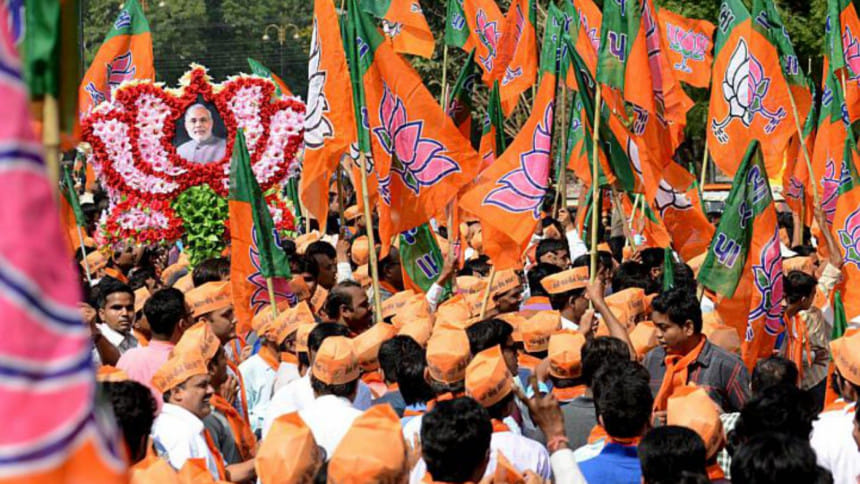A new RSS-BJP compact?

IT'S a sad comment on India's mainstream media that it didn't notice the irony of a representative of the Sangh Parivar—a current which inspired Mahatma Gandhi's assassination—being invited to the unveiling of his statue in London. The event was organised by the Tories, who loathed Gandhi, with an eye on the British-Gujarati vote in the coming election.
The Indian media now pays mere lip service to secularism and liberalism while ignoring the Parivar's attacks on them. Many papers criticised its Love Jihad and Ghar Wapsi campaigns. But few criticised the premises underlying them, or noted their impact in debasing India's public discourse or making the religious minorities insecure.
In recent weeks, the Parivar has further poisoned the climate with three new offensives: attacking Christian institutions; pushing brazenly majoritarian policies in BJP-ruled states; and further communalising the Indian Council of Historical Research. This last is part of the Parivar's Long March through the Institutions. The March will seriously damage democracy.
Indian Christians have come under vicious attack since RSS chief Mohan Bhagwat a month ago accused Mother Teresa of using charity as a cover for religious conversion. In Delhi, five churches were attacked in nine weeks. In West Bengal, a 71-year-old nun was raped; in Haryana, a church was vandalised. Haryana's chief minister defended the attackers by claiming the church priest was trying to convert Hindu men by promising them brides, as if that justified crass vandalism!
The VHP's Surendra Jain called the 1857 revolt an anti-Christian war. He asked whether a Hanuman temple would be allowed in the Vatican. Worse, he said sexual exploitation of nuns was part of Christian culture; so the Pope is promoting gay sex. (The Times of India, Mar 16)
This disgusting anti-Christian tirade impelled former Punjab police chief, and anti-terrorism hero, Julio Ribeiro Ribeiro's to write an impassioned protest article.intervention will have international impact.
BJP-ruled state governments are subverting democracy in numerous ways: lifting the ban on their employees joining the RSS (Chhattisgarh), making the Bhagwad-Gita compulsory in schools (Haryana), and punishing possession or consumption of beef with five years' imprisonment (Maharashtra).
Allowing state employees to join the RSS undermines the principle of a politically impartial bureaucracy, crucial to a rule-of-law society. The RSS is NOT a social-cultural organisation. It's a political entity. It lays down the BJP's political line and nominates its key organisational personnel.
Gujarat lifted the RSS ban in 2000. Despite its reversal, the move communalised the bureaucracy and police. Its dreadful impact became visible in 2002.
The BJP is taking its proselytisation drive even to posh private schools like Ryan International (133 branches), whose managing director is the BJP women's front secretary.
Take the beef ban. Surveys show that three-fourths of all beef sold is consumed by Hindus, especially poor Hindus. It's a cheap high-quality protein source. Banning slaughter of old/unproductive cattle will destroy lakhs of livelihoods, and further degrade the environment.
The idea that the majority's food preferences should be imposed upon the rest is undemocratic. No pious upper-caste Hindu should be forced to eat beef. But equally, no Muslim, Northeastern tribal, Christian or Dalit should be refused the choice of eating what they like.
In making new ICHR appointments, the government has broken the long-standing convention of reappointing members who have completed one term, and purged the Council of secular-minded scholars. The 18 new appointees, barring a couple, are close to the Bharatiya Itihas Sankalan Yojana, an obnoxiously obscurantist group, some of whose members believe the Taj Mahal is a Hindu temple!
The Parivar's new aggression seems to be related to a recent BJP-RSS understanding, which became evident at the Sangh's just-concluded Akhil Bharatiya Pratinidhi Sabha.
The RSS has set aside its differences with the BJP on Kashmir, the Land Acquisition Ordinance, and higher foreign investment in insurance, etc, to back the ruling alliance solidly.
The differences aren't trivial. Some actions of the PDP-BJP alliance are at odds with the core positions on Kashmir, but the fact that the alliance is in power is a coup for the Sangh. Similarly, the Bharatiya Kisan Union has problems with the land Ordinance, but the RSS has silenced it.
The RSS believes that with the BJP in power with a majority, it has a unique opportunity to mainstream itself by capturing institutions, and opening up settled issues, such as Hinduism's socio-cultural primacy, religious conversion, etc, which could help redefine India as a Hindu society.
The RSS needs the support of state power to do this. So it'll back the BJP's pro-corporate neoliberal economic policies. The BJP, in turn, will give the Parivar freedom to push its backward-looking social agenda. That's why Modi has done nothing to restrain the Parivar, barring issuing a weak, vague statement.
The Parivar is no longer "fringe"; it's an almost equal partner of the BJP. Despite the efforts of some confused, and some very devious, elements to give it respectability, the BJP remains an extremist party, with a hardline, expansionist Hindu-supremacist agenda—and a menace to democracy.
The writer is an eminent Indian columnist.

 For all latest news, follow The Daily Star's Google News channel.
For all latest news, follow The Daily Star's Google News channel. 



Comments